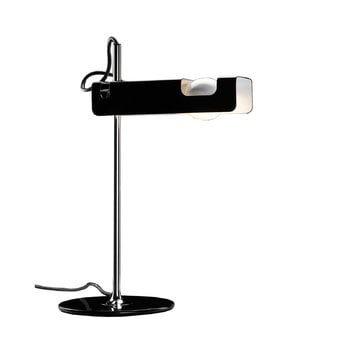Spider 291 table lamp by the Italian lighting company Oluce is equipped with a 40-centimeter high metal stem and a lacquered, adjustable aluminum reflector. The reflector has a rectangle-shaped hole which allows the light bulb to become part of the lamp’s geometrical character. Designed by Joe Colombo in 1965, the Spider won the Compasso d’Oro award in 1967 and it belongs to the permanent collections of the art museums of Philadelphia, Düsseldorf and Munich.
Spider 291 table lamp, black
Oluce
Description
Spider 291 table lamp by the Italian lighting company Oluce is equipped with a 40-centimeter high metal stem and a lacquered, adjustable aluminum reflector. The reflector has a rectangle-shaped hole which allows the light bulb to become part of the lamp’s geometrical character. Designed by Joe Colombo in 1965, the Spider won the Compasso d’Oro award in 1967 and it belongs to the permanent collections of the art museums of Philadelphia, Düsseldorf and Munich.
Product details (14)
- Material
- Chromium-plated metal, lacquered aluminum
- Colour
- Black
- Width
- 18 cm
- Diameter
- 18 cm
- Height
- 40 cm
- Bulb base
- G9
- Light source
- Max. 48W (included)
- IP rating
- 20
- Protection class
- I
- Voltage
- 220 V
- Certifications and labels
- CE, CB, CCC
- Plug
- EU plug
- Cable colour
- Black
- Dimmable
- No
- Product ID
Designer
Joe Colombo (1930–1971) was an Italian industrial designer who became known for his futuristic style and interest for multi-functional, modular systems. After studying painting and architecture in Milan, Colombo worked actively as a painter and sculptor before starting his career as an industrial designer in the 1950s.
His best known works include minimalist lamps designed for Italian lightning company Oluce and the plastic Boby storage trolley. His work has been exhibited at many museums, such as New York’s MoMA.
View all productsReviews (0)
Sustainability
The Product Sustainability Framework, our criteria of sustainable design, helps you find the most sustainable products in our selection. Read below which sustainability criteria this product has met.
Working conditions & labour 7/9
-
Equal opportunities for all employees
-
Commitment to UN Global Compact, fair compensation for all employees
-
Corporate responsibility requirements defined and communicated for suppliers
-
Systematic work for improved inclusion and well-being in the workplace
-
Transparent supply chain
-
Suppliers' compliance to a code of conduct ensured
-
Compliance to the UN Guiding Principles on Business and Human Rights ensured in the supply chain
-
Direct suppliers audited and certified
-
Support for community involvement in the supply chain
Eco-friendly production 8/9
-
Fair and resource-wise water-use in production
-
No incineration or landfilling of returned items
-
No use of endangered species as materials
-
No direct environmental emissions or waste (excl. GHGs) from production
-
The sustainability of direct suppliers' production is addressed and monitored
-
Production and material sourcing that respect biodiversity, animal rights, and natural ecosystems
-
Material-efficient and ecological packaging
-
No potentially harmful chemicals used in own production
-
Positive impact on nature’s well-being through operations that regenerate natural ecosystems
Climate impact 5/8
-
Company's direct greenhouse gas emissions identified and commitment to reduction
-
Product's carbon impact identified and commitment to reduction
-
Guidance on energy- and eco-efficient use of the product
-
Low-carbon or compensated transportation
-
Carbon neutral or carbon negative product
-
Contribution to climate initiatives beyond the brand’s direct operations
-
Carbon footprint of the product calculated and goals set to reduce it
-
100 % renewable energy in own production and operations
Sustainable materials 6/6
-
Sustainable and long-lasting material choices
-
No harmful or hazardous substances
-
Responsible raw material sourcing and production
-
Materials suited for circularity: monomaterials, recyclable finishings, renewable or recycled contents etc.
-
Ecological materials: natural, biodegradable, recyclable or recycled contents
-
Outstanding materials in terms of innovativeness, responsibility, sustainability and circularity: local production or sourcing, 100 % recycled content, C2C-certification etc.
Circular design 5/5
-
High aesthetic quality promoting long-term use of the product
-
Technically durable product design and material choices
-
Design for enduring life-long quality
-
Design and support for product maintenance, repair and upgradability
-
Innovative circular design solutions: circular service system, resale platform, remanufacturing, collection of used products, etc.




